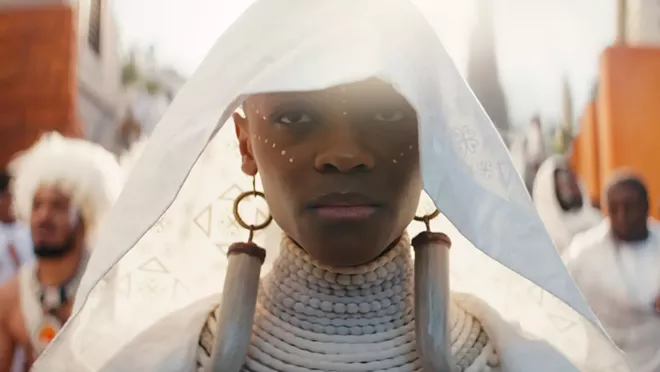How can art reckon with a loss as titanic as that of Chadwick Boseman? The acclaimed actor was a gifted performer with an irreplaceable presence that would light up the screen every time he appeared. Though he became most-known for his role as King T'Challa in the original Black Panther film from 2018, he brought the same grace and gravitas to each and every role that was lucky enough to have him. His death at just age 43 — from a cancer he battled privately while continuing to act — remains as painful today as it was when it happened more than two years ago.
It is in this overwhelming pain that Black Panther: Wakanda Forever initially places us. Returning writer/director Ryan Coogler begins this story not with an action set piece, but with a desperate attempt to save an ailing T'Challa whose time is now short. We see his younger sister, Letitia Wright's Shuri, futilely trying to find a cure that will prevent the loss we all know is coming. She is soon informed by her mother, Angela Bassett's Ramonda, that he has already passed. The film then guides us through a collective celebration of the character's life that also serves as an honoring of Boseman. It is a sequence that is infused with a sadness that Coogler doesn't shy away from grappling with. We see it in the mural of the man himself overlooking the procession and hear it in Shuri's cries when she rushes to say goodbye one last time. It is a deeply felt opening that ends with the first of many silent cinematic reflections, ones more moving than anything we've seen in a Marvel movie. For all the ways this cinematic universe can seem constructed by a corporate machine, these moments feel driven by people tapping into something real.
It is in these questions of loss where Black Panther: Wakanda Forever proves to be profound. Unfortunately, there is the rest of the nearly three-hour film that tempers and distracts from this emotionally-driven beating heart.
A rather busy plot becomes the most central focus and pulls us away from the moments of rumination. Essentially, the nation of Wakanda is now facing down outside governments that want their resources and will do anything to get them. Enter Namor, played by the terrific Tenoch Huerta, an imposing figure with wings on his feet, immense strength and the ability to breathe underwater. He tells a still-grieving Shuri and her mother that he needs Wakanda to go on a mission for him to prevent further encroachment on his underwater homeland. This sets in motion a growing conflict that will threaten to consume the two civilizations and all they have worked to build.
The promise that this story holds ends up being largely squandered on the more scattered cinematic spectacle, which requires jumping around from location to location in a manner that grows tiresome. When the film stops to catch its breath, like when Shuri and Namor candidly discuss their respective worlds, we get a glimpse of a more personal story free of all the narrative trappings. Unfortunately, these moments become lost when we get into largely middling CGI action sequences — a lot of narrative noise that lacks the prevailing emotional spark that was felt in the original Black Panther.
Perhaps this is a product of how a Marvel movie must still hit certain notes that audiences come to see. No matter if it drags down this film, there must always be a new character to tie-in, a surprise cameo and some self-aware comedy. The moments when the film steps away from this, including in a closing scene where we are left with just a single character, are bold, though regrettably fleeting. Despite all the often empty bombast and bluster, it is in the moments of silence where the film still manages to strike a chord that serves as an emotional echo of what could have been. ♦





















